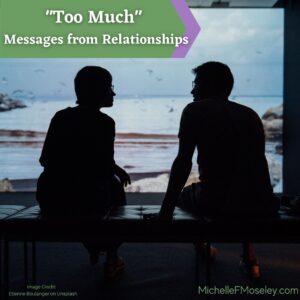Our relationships with others can play a large role in how we view ourselves and how we show up in the world. We receive messages throughout life from those important to us. Sometimes these messages come from direct statements, and other times they are inferred from a look or a comment. The messages from those we are in closest relationship with – family, friends, partners – generally carry the most weight in our lives. We may learn we are “too much” as we interact with others in these relationships.
From Family
Imagine you’re sharing with family about a new concept or idea you’ve come across. You’re talking excitedly about things, maybe using animated language or body movements. You’re sharing how you think this idea could influence the future, how you envision your role in creating that new future. Yet, your family responds with blank stares or interrupts you to completely change the subject. You interpret that you’re “too passionate” or “too out of the box”, that you’re ideas and words are not welcome here.
Maybe you’ve recognized some patterns in your life where you have taken on the emotions and/or tasks of family members. You may have taken on the role of supporting an adult caregiver when you were young, but recently set a boundary on the emotional labor you are willing to do for others. You may have previously found yourself dropping everything anytime a family member called, and now you’re working on having different boundaries around your time. You’re proud of the work you have been doing to grow and change behaviors that weren’t working for you. Yet, you’re continually hearing family members complain that you’re “too unavailable” or being “too selfish.”

From Friends
You enjoy inviting friends into your home, but are often left feeling shame in response to their comments about your space. Maybe you prefer to have things in easy reach, are in the midst of multiple projects, or simply have your own concept of what feels cozy. Yet your friends often comment in a way that you internalize as you’re “too messy.” Or, it could be the opposite. Perhaps you prefer things to be organized in a certain way – this helps you feel secure in your home. But friends make off-hand comments about you being “too organized” or “too much of a control freak.” Either way, you’re hearing that your preferences, even in your own home, are not okay.
Perhaps you’re single, and you have no interest in dating someone just to have something to do. You know your own values and what characteristics are important in a partner for you. You share with your friends that you’ve been out with someone a few times, but are not continuing to see them. Could be that you’ve learned their values are quite different than yours, that you each feel strongly about having children (but in opposite directions), or any number of valid reasons that you know there isn’t a future for you with this person. Your friends roll their eyes, they complain about how you approach relationships, they may even tell you “you’re too picky.”
From Partners
Imagine you find yourself in a partnered relationship – dating, marriage, long-term commitment, whatever the case may be. Our own attachment style and wounds from previous relationships often show up in partnered relationships – we seek safety and security, but depending on a variety of factors, we may or may not know how to express that need in a healthy way. Our partner may or may not know how to recognize and meet that need in a healthy way.
Maybe you seek reassurance from you partner that they care for you, that they aren’t upset with something you’ve said or done, that you are not being abandoned. These are very real needs, and sometimes folks try to get those needs met in ways that are not healthy or effective. You may call/text multiple times, continually ask if your partner is upset after they have said they are not, or withdraw from your partner to avoid being hurt. Whether from your partner’s response or your own internal dialogue, you may get the message that you are “too needy.”
Or maybe you are a person who deals with that desire for security in relationship by attemppting to ensure your partner can’t hurt you. You have your own friends, your own hobbies, your own life completely separate from your partner. You sometimes let your partner into your life/activities, but they are continually the one requesting your time and attention. Whether from their response or your own thoughts, you may get the message that you’re “too independent.”
Finally, the messages received in partnered relationships are often influenced by societally-assumed gender roles, as well. Despite the fact that all genders can be present in partnered relationships, there is still a very strong sense of ‘female roles’ and ‘male roles’ within these relationships. Imagine you are a female in a relationship. You have a background in a particular topic, perhaps have even done intentional study of that topic. Yet, when you attempt to share your knowledge and insight, you clearly get the message you are “too opinionated”, “too outspoken”, maybe even “too aggressive.” Alternatively, when you share your concerns with your partner or express your anger regarding an injustice, you’re labeled as “too emotional.” Or sometimes simply “too much.”
Sound Familiar?
Did you find yourself nodding your head as you read any of these examples of the “too much” messages folks receive within their relationships? Maybe you recognized – for the first or the hundredth time – that you carry one of these “too much” messages around in your head. That it influences your daily life, how you show up in the world. Some of the ways this might affect your life are that you experience ongoing worry about others’ perceptions of you, find yourself chronically ill because you struggle to take care of yourself, deal with self-doubt and feeling like you’re not enough, or have a pattern or relationship difficulties that you just can’t seem to change.
If you resonate with any of these examples, or have other “too much” messages that are influencing your life, I invite you to contact me so we can see if the support I offer can assist you in being a healthy, full version of yourself. I want you to show up in your life fully!
This is part four of a multi-part series on how the messages of being “too much” can impact our lives. Read more about messages from childhood, messages from adolescence, and messages from religion, and stay tuned for the rest of the series.
Disclaimer: While these examples are based on common themes I hear in my work as a mental health counselor, please know they are not the direct story or experience of any one client.
Michelle F. Moseley is a licensed clinical mental health counselor providing telehealth services in the state of North Carolina. She specializes in providing support for folks who struggle with feeling they are “too much”, yet worry they are not enough. She works from a trauma-informed perspective, and believes that ALL people deserve respect, compassion, and to feel heard. Learn more about Michelle by visiting www.MichelleFMoseley.com or following her on Instagram – @therapy_with_michelle


